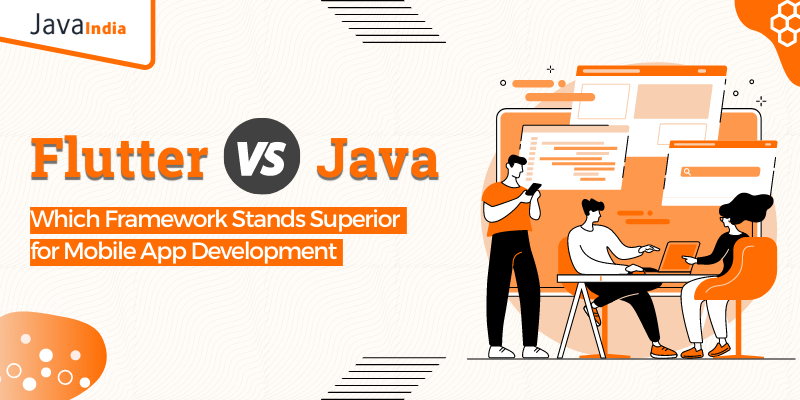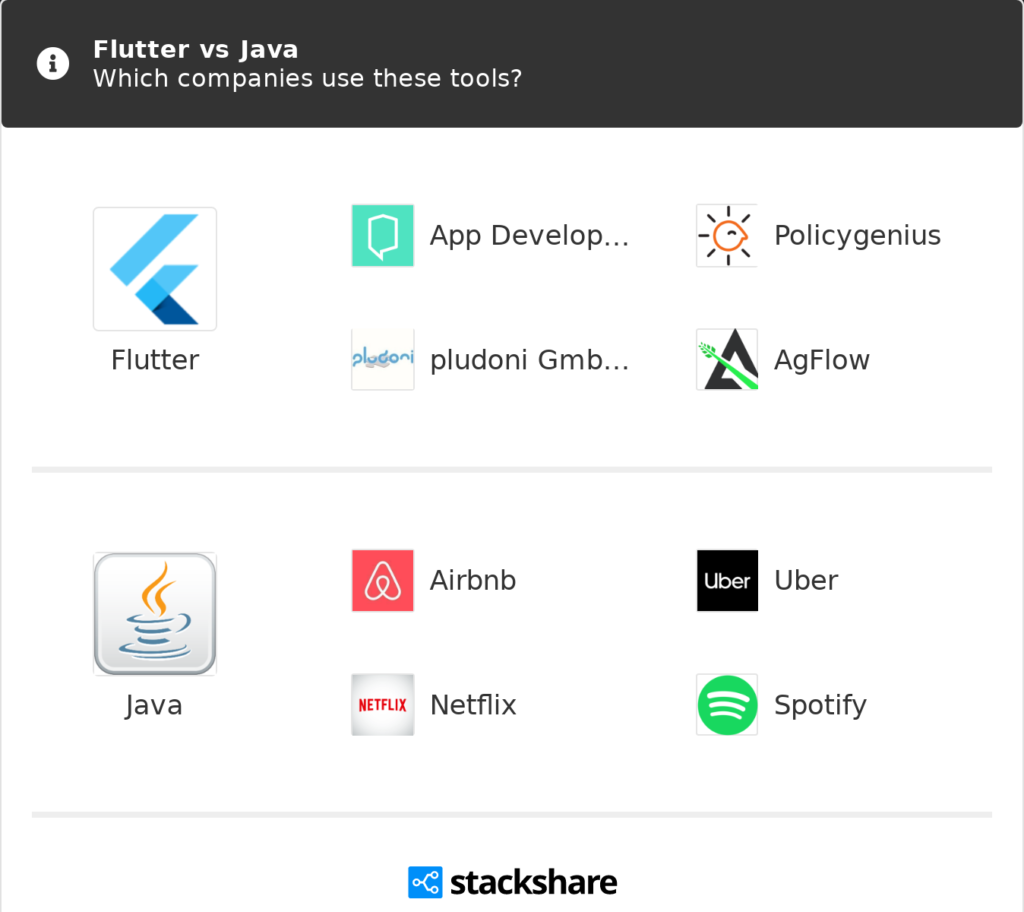
Flutter Vs Java: Which Framework Stands Superior for Mobile App Development?
Mobile app development is an ever-changing and evolving ecosystem. It does not stick to a single best app development technology only. There are a plethora of native and cross-platform development frameworks and programming languages available to create a feature-rich, scalable, and intuitive application. In the midst of this, there lie the ongoing differences of Flutter Vs Java.
Flutter is a cross-platform app development that is an offering by Google and ideally used to create Android & iOS apps using a single codebase. Whereas, Java is a universally acclaimed and accepted programming language which is best used to develop scalable android apps.
Both the choices are available as per your mobile app development requirements. But which one to choose depends on your needs and the functional reach of both the technologies. Therefore, we bring light on Flutter Vs Java based on reach, features, and key differences.
What is Java?
Java is a widely used, object-oriented general-purpose programming language that made its inception way back in 1995. It was released by Sun Microsystem as a programming language and computing platform to develop apps for gaming consoles, supercomputers, mobile, and other devices widely.
As compared to Flutter, Java is easy to learn and well-adapted across a diverse area of Java mobile application development. Java features a wide set of libraries and language support to create scalable apps for mobile, desktops, and the web.
What is Flutter?
Flutter is a cross-platform mobile framework that is supported by Google and quite younger than Java. This framework helps to develop an app for Android and iOS operating system simultaneously using a single-codebase. Unlike Java that has a limited close to only Android app development, Flutter is best recommended for cross-platform app building at less cost and in the shortest possible time.
Flutter Vs Java: The Key Differences
The difference between Java and Flutter is based on several factors that you will be looking at below:
1. App Development: Designing a mobile app for both Android and iOS platform using a single codebase is possible with Flutter. However, the Java programming language supports you in terms of developing only Android apps. Whereas, Flutter helps developers to create apps for both platforms in the shortest possible time.
2. Documentation & Resources: As already mentioned, Java was introduced in 1995 and widely accepted as a pioneer object-oriented language. So, resources and documentation of Java are spread across a wide area and most of the developers have direct access to the same. And, you can swiftly hire Java developer to meet your diverse requirements. On the other side, Flutter was introduced in 2017 and not much time has passed since its inception. Therefore, the informational and documentary reach of Flutter is less as compared to Java.
3. Development Speed: Flutter ensures speedy development of iOS and Android apps together. If you want to create the same on Java, then it will take time to develop an Android application and move on to another framework for iOS development.
4. Coding: Flutter offers the single-codebase structure to developers and creates Android and iOS apps at the same. This facility is not available with Java, because you can only develop Android apps using this programming language.
5. Cost: Flutter is cost-effective in terms of hybrid app development only. Whereas, if you are planning for only Andriod app development, then Java also takes less time, effort, and investment.
A Comparison Table: Flutter Vs Java
| Flutter | Java | |
| Date Launched | 2017 | 1995 |
| Developer | Oracle | |
| Programming Language | Dart | Java |
| Open-Source | Yes | Yes |
| Description | Cross-platform UI software development kit | High-level and object-oriented programming language |
| App Development | Cross-platform | Cross-platform |
| UI Performance | Effective & flexible | Lacks in expressiveness |
| Martial Design | Yes | Yes |
| Popular Apps | Topbuzz Toutiao | Twitter Spotify |
Flutter Vs Java: Features
Flutter:
Hot Reload is a process that enables developers to view instant updates without having to compile the whole app all over again.
Cross-platform capabilities mean coding one time will lead to releases on various operating systems and platforms. Performance is its third advantage, making for smooth animations at 60 frames per second across different devices.
Behind this all? Google, who backs Flutter with precompiled commands for compilation. The process of using Flutter entails writing customizable UI in code rather than working through complicated set-ups like other frameworks require.
Flutter also offers rapid prototyping possibilities which allow designers to rapidly develop apps based on changing customer requirements while providing flattery. And, cleaner interfaces thanks to Material Design cues such as consistent navigation patterns and cohesive visuals.
Java:
It provides an incredibly vast set of libraries to develop Web, Mobile and Desktop applications. One can use it as a language for developing this kind of app. It has excellent tooling. An abundant number of developers are available for this programming language.
It offers great documentation for app development and there is an abundance of IDE tools that can be used when coding Java programs.
A lot more people know about Java these days because it is so easy to use, even those who aren’t programmers!
The newest version also packs improved syntax support and readability improvements – all at no cost!

Final Verdict
So, that’s all we have to share about the comparison between Flutter Vs Java. From the above discussion, it is clear to say the fact that you can choose between the two based on business requirements, budget, and time to devote.
Flutter is an ideal pick to create iOS and Android apps at a single cost. Java is also best in terms of result-oriented Android app development. Whatever the decision will be, you can get in touch with JavaIndia. It is a leading development company that offers end-to-end Java development services to different industry verticals.
Frequently Asked Questions
1. How Java is Useful for Mobile App Development?
Java is a widely accepted, object-oriented programming language for profit-oriented Android app development. There is a wide section of Java developer’s community available having hands-on experience and wide accessibility towards rich resources and documents. Concerning all this, it is better to develop an Andriod app using Java with easy accessibility towards professional mobile app developers.
2. In How Much Time a Java Application can be Created?
Every single enterprise has different requirements related to end-to-end mobile app development. Thus, several factors like the type of functionalities, range of features, any complexity, and the number of resources on your project will be taken into consideration before deciding the timeline.
3. How Can I Find a Professional Java Developer?
For this, you can get in touch with us and get connected to a talented pool of Java developers. Our team consists of professional experts having prior experience in developing full-fledged Android app using Java and meeting the varied requirements of clients.
4. Is Flutter better than Java?
Flutter is a cross-platform mobile development tool and Java is a language. From this, it becomes clear that they are different from one another.
5. Is Flutter Becoming More Powerful Than Java?
Industrial experts are beginning to think that Flutter may actually supplant Java as the go-to means of creating Android apps. In fact, there are many who speculate that it will someday replace traditional options such as Java entirely.
6. Is Flutter worth the time and effort to learn?
A good mobile app could make all the difference for your business.
Flutter is a new software development platform launched in 2017. It’s still relatively new in this industry, but it has already made waves in the world of mobile apps!
Flutter is open-source UI SDK with both JAVA/Kotlin and Dart programming languages available on Android, iOS, web browsers, desktops.

